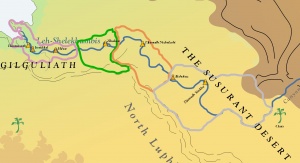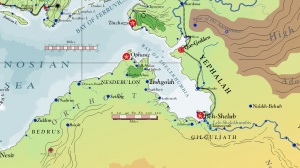Difference between revisions of "Shelekhumbia"
Trismegistus (talk | contribs) m |
Trismegistus (talk | contribs) |
||
| (One intermediate revision by the same user not shown) | |||
| Line 120: | Line 120: | ||
{{See also|Ishmutekebessa}} | {{See also|Ishmutekebessa}} | ||
* reign ca. 2202 to 2286 | * reign ca. 2202 to 2286 | ||
| + | |||
| + | ==Free City-States== | ||
| + | 2286 to ca 2550 | ||
==Gorcorumbese Rule== | ==Gorcorumbese Rule== | ||
Latest revision as of 13:02, 28 October 2024
anglicized pronunciation /ˈʃɛləˌkʌmbiə/. Shelekhumbia encompasses the lands of the Bay of Shelekhumbia and the lands along the Leh-Shelekhumbis River. The term is historic and cultural, not political. The modern government of these lands is the Sultanate of Beph-Themesh.
Shelekhumbia is a semi-arid to arid region traversed by the waters of the Leh-Shelekhumbis River. It was inhabited in ancient times by the Shelekhumbi people. Later, Thammazite Tribes migrated from southern Weshif into the land.
Geography

Shelekhumbia is a dry region that lies in northern Weshif, hemmed in to the northeast by the Adamantine Mountains and to the southwest by the much smaller Luphkhaymen Mountains. The Leh-Shelekhumbis River is critical to the region, providing water, irrigation, and riparine transportation to desert towns and cities. The desert in which much of Shelekhumbia is found is called the Susurrant Desert.
History
Regions of Ancient Shelekhumbia: Yume, Omenti, Tihune, Lush (Lawash).
City-State Period
ca. 5600 AS to 4900 AS

- Elántuventh: controls mouth of Leh-Shelekhumbis River, Imriddad, Ekhur. Elántuventh is center of the cult worship of the river god, Leh-Shelekhumbis. God Kuma also worshiped.
- Zihaksar (rich mines to south)
- Djamudh Nezbulzobi: struggles with Djamudh Yankha for control of Ilishobaz
- Djamudh Yankha: controls Ilishobaz and has access to desert oasis
Divinities Worshiped in the City-State Period
- Djazuh, god of sun and upper atmosphere
- Hebsheth, mother goddess
- Kuma, god of subterranean waters
- Shalakhmu, god of the Leh-Shelekhumbis River.
- Ishmût: goddess of the waters of chaos or creation, thought to have become subject to Kuma.
Jairutthalese Rule
- ca 7300, ruled by Kalama
considered apocryphal by most scholars
Nomadic Invasions from Weshif
The City-State period ends in early fifth millennium with the press of the Thammazite Tribes out of Weshif. These desert nomads push the Esabdalite people, already living in Weshif into Shelekhumbia. The Shelekhumbians resettle the Esabdalites into Yephalah. They became a buffer state against the incursions of the Adamantine Giants who also invaded from the east during this tumultuous period.
Migration of the Thammazite Tribes
ca 4550 AS to 4100 The Thammazite tribes migrate in waves through Shelekhumbia, ruling for a short dynasty, and then are thrust out of Shelekhumbia. They migrate into the west.
Invasion of Addamantine Giants
In the forty third century (ca 4,400 AS to 4,300 AS), the Adamantine Giants were united under a powerful warlord who led them out of their mountain fastnesses to invade and settle in Shelekhumbia. The giants also conquered Kalama. Eventually, these giants were overthrown and expelled. Their invasion is thought to be one of the motivations for the Thammazite Tribes migrating into eastern Danona.
Exodus of Thammazite Tribes
ca 4100 AS, Thammazite Tribes migrate out of Shelekhumbia into western Orthont and thence to Thyria.
Kingdom of Elántuventh
'Leh-Shelekhumbite Valley Civilization' ca 4100 AS to 3825 AS A strong military kingdom is established that repels the Adamantine Giants and the desert nomads. The High-Priest becomes ruling monarch.
Two Kingdoms
ca 3825 AS to 3250 AS Kingdom of West and Kingdom of East
ca. 3600, immigration of moreThammazites from Orthont
Rule of the Dalish
ca 3250 AS to 2950 AS become tributaries of the Adamantine Giants, attempt to rebel, and are eliminated.
Adamantine Rule
ca 2950 AS to 2825 AS Direct Rule of Adamantine Giants
Rule of Zuranteshmet Priestesses
ca 2825 AS to 2425 AS, ca ~400 years Shelekhumbians entreat desert tribes for aid who help overthrow the rule of Adamantine Giants and in turn rule Shelekhumbia. A powerful chieftain helps the Shelekhumbian subjects of the Adamantines. He summons djinn and other creatures to help fight the Adamantine Giants. His daughter, Zuranteshmet, establishes a dynasty of priestess-queens.
Sarduritic Dynasty of Shamrigar
2425 AS to 2210 AS, ~215 years Queen Sardurit begins Sarduritic Dynasty in Shamrigar, contemporary with Surizhah Kingdom of Kalama. River city-state on the Leh-Shelekhumbis River in the land of Lush.
ca. 2100 AS: approximate end of Shelekhumbian Bronze Age and rough beginning of Shelekhumbian Iron Age.
Zamshagolian Empire
- 2040 AS to 1300 AS
City-State of Zam Shagol in the delta of the Leh-Shelekhumbis River. ca. 1500 AS,
ca. 1300 AS, overthrown by alliance of Omeroparans and Elántuventhese city-states
Omeropar
- becomes powerful city state ca. 1200 AS on upper Leh-Shelekhumbis River
Elántuventh
- established in third millennium before Salmakhamer
- becomes pre-eminent in lower Leh-Shelekhumbis valley in second millennium before Salmakhamer
- expands in the early first millennium before Salmakhamer.
- Dagaithi Tribes raid and occupy parts of Shelekhumbia
- * *
Yophenthean Rule
- 607 Yophenthean Conquest of Shelekhumbia
Priest-Kingdom of Awakaan
ca. 1100
Imzaami Expansion
ca. 1300 to 1325
Pre-Ismutekebessan Middle Ages of Chaos
ca. 1800 to ca 2250
- Nifsazari
- Mage-Kingdom of Nu-Shahazu (Female Giant Queen, includes Shakhrilim and Kishkelumadh)
- Priest-Kingdom of Shelekhumbia
Rule of Ishmutekebessa
- reign ca. 2202 to 2286
Free City-States
2286 to ca 2550
Gorcorumbese Rule
ca. 2550 to 2556 (Third Geddamin War)
Asraelun & Beph-Themesh
- 2587 (after Fifth Geddamin War)
- 2589 Rise of House Tchula
- 2595 House Tchula consolidates ruler of Shelekhumbia and establishes the Sultanate of Beph-Themesh, independent from Asraelun.
See Also
- Gods and Religion of Shelekhumbia
- Ishmutekebessa Goddess-Queen of Leh-Shelekhumbis
- Leh-Shelekhumbis River
- Shelekhumbi Language
- Sultanate of Beph-Themesh
| This article is a stub. It requires further development by the creator. |
